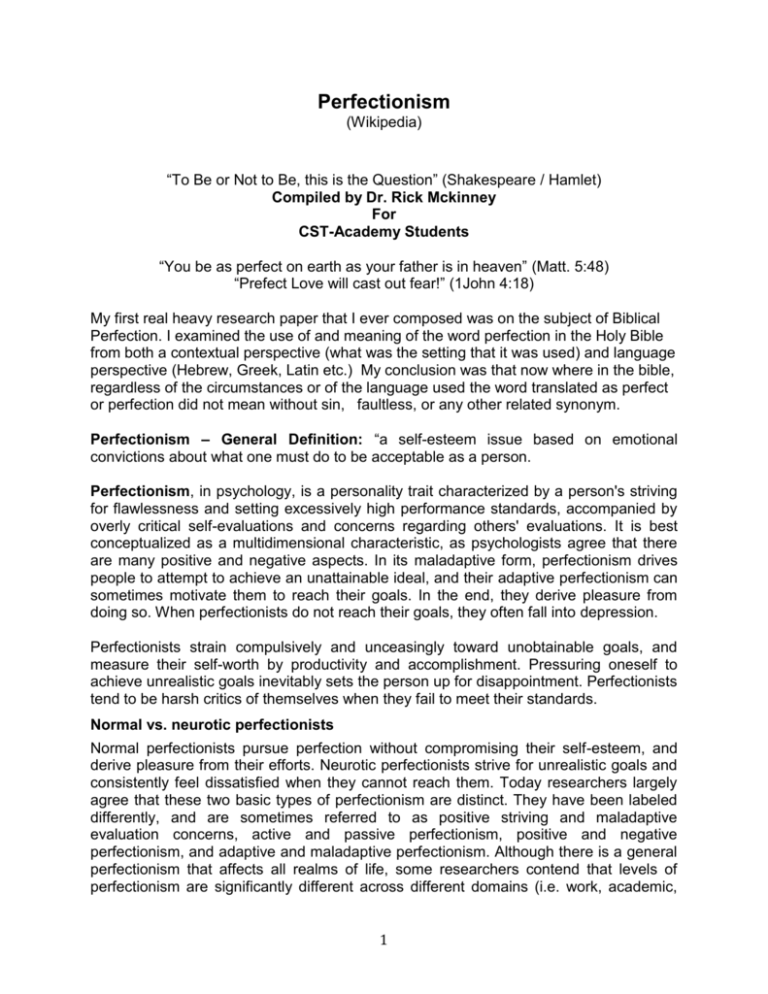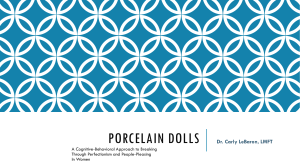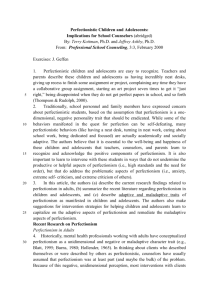Perfectionism Lesson 8 Webinar Script
advertisement

Perfectionism (Wikipedia) “To Be or Not to Be, this is the Question” (Shakespeare / Hamlet) Compiled by Dr. Rick Mckinney For CST-Academy Students “You be as perfect on earth as your father is in heaven” (Matt. 5:48) “Prefect Love will cast out fear!” (1John 4:18) My first real heavy research paper that I ever composed was on the subject of Biblical Perfection. I examined the use of and meaning of the word perfection in the Holy Bible from both a contextual perspective (what was the setting that it was used) and language perspective (Hebrew, Greek, Latin etc.) My conclusion was that now where in the bible, regardless of the circumstances or of the language used the word translated as perfect or perfection did not mean without sin, faultless, or any other related synonym. Perfectionism – General Definition: “a self-esteem issue based on emotional convictions about what one must do to be acceptable as a person. Perfectionism, in psychology, is a personality trait characterized by a person's striving for flawlessness and setting excessively high performance standards, accompanied by overly critical self-evaluations and concerns regarding others' evaluations. It is best conceptualized as a multidimensional characteristic, as psychologists agree that there are many positive and negative aspects. In its maladaptive form, perfectionism drives people to attempt to achieve an unattainable ideal, and their adaptive perfectionism can sometimes motivate them to reach their goals. In the end, they derive pleasure from doing so. When perfectionists do not reach their goals, they often fall into depression. Perfectionists strain compulsively and unceasingly toward unobtainable goals, and measure their self-worth by productivity and accomplishment. Pressuring oneself to achieve unrealistic goals inevitably sets the person up for disappointment. Perfectionists tend to be harsh critics of themselves when they fail to meet their standards. Normal vs. neurotic perfectionists Normal perfectionists pursue perfection without compromising their self-esteem, and derive pleasure from their efforts. Neurotic perfectionists strive for unrealistic goals and consistently feel dissatisfied when they cannot reach them. Today researchers largely agree that these two basic types of perfectionism are distinct. They have been labeled differently, and are sometimes referred to as positive striving and maladaptive evaluation concerns, active and passive perfectionism, positive and negative perfectionism, and adaptive and maladaptive perfectionism. Although there is a general perfectionism that affects all realms of life, some researchers contend that levels of perfectionism are significantly different across different domains (i.e. work, academic, 1 sport, interpersonal relationships, home life). Particular types of Perfectionism (Measurable by Scales) 1. PAP (the desire for a perfect physical appearance or Physical Appearance Perfectionism). 2. APP (Almost Perfect Perfectionism) Psychological Implications of Perfectionism Perfectionists are focused on personal integrity and can be wise, discerning and inspiring in their quest for the truth. They also tend to dissociate themselves from their flaws or what they believe are flaws (such as negative emotions) and can become hypocritical and hypercritical of others, seeking the illusion of virtue to hide their own vices. Researchers have begun to investigate the role of perfectionism in various mental disorders such as depression, anxiety, eating disorders and personality disorders. Each disorder has varying levels of the three measures on the MPS-scale. Socially prescribed perfectionism in young women has been associated with greater body-image dissatisfaction and avoidance of social situations that focus on weight and physical appearance. The self-help book “Too Perfect: When Being in Control Gets Out of Control” contends that perfectionists have obsessive personality types. Obsessive personality type is different from obsessive-compulsive disorder (OCD) in that OCD is a clinical disorder that may be associated with specific ritualized behavior. Perfectionists are obsessives who need to feel in control at all times to protect themselves and ensure their own safety. By always being vigilant and trying extremely hard, they can ensure that they not only fail to disappoint or are beyond reproach but that they can protect against unforeseen issues caused by their environment. Vigilance refers to constant monitoring, often of the news, weather, and financial markets. Perfectionistic strivings vs. perfectionistic concerns Perfectionism consists of two main dimensions: perfectionistic strivings and perfectionistic concerns. Perfectionistic strivings are associated with positive aspects of perfectionism; perfectionistic concerns are associated with negative aspects (see below). Healthy perfectionists score high in perfectionistic strivings and low in perfectionistic concerns. Unhealthy perfectionists score high in both strivings and concerns. Non-perfectionists show low levels of perfectionistic strivings. Prompted by earlier research providing empirical evidence that perfectionism could be associated with positive aspects (specifically perfectionistic strivings), they challenged the widespread belief that perfectionism is only detrimental. In fact, people with high levels of perfectionistic strivings and low levels of perfectionist concerns demonstrated more self-esteem, agreeableness, academic success, and social interaction. This type of 2 perfectionist also showed fewer psychological and somatic issues typically associated with perfectionism, namely depression, anxiety, and maladaptive coping styles. Perfectionists desire perfection and fear imperfection and feel that other people will like them only if they are perfect. Perfectionism itself is thus never seen as healthy or adaptive Perfectionism is not the same thing as striving for excellence.The difference is in the meaning given to mistakes. Those who strive for excellence can take mistakes (imperfections) as incentive to work harder. Unhealthy perfectionists consider their mistakes a sign of personal defects. For these people, anxiety about potential failure is the reason perfectionism is felt as a burden. Positive Aspects of Perfectionism Perfectionism can drive people to accomplishments and provide the motivation to persevere in the face of discouragement and obstacles. "In a positive form, perfectionism can provide the driving energy which leads to great achievement. The meticulous attention to detail, necessary for scientific investigation, the commitment which pushes composers to keep working until the music releases the glorious sounds playing in the imagination, and the persistence which keeps great artists at their easels until their creation matches their conception all result from perfectionism." Slaney and his colleagues found that adaptive perfectionists had lower levels of procrastination than non-perfectionists. In the field of positive psychology, an adaptive and healthy variation of perfectionism is referred to as Optimalism. Negative Aspects of Perfectionism In its pathological form, perfectionism can be damaging. It can take the form of procrastination when used to postpone tasks and self-deprecation when used to excuse poor performance or to seek sympathy and affirmation from other people. In general, maladaptive perfectionists feel constant pressure to meet their high standards, which creates cognitive dissonance when one cannot meet their own expectations. Perfectionism has been associated with numerous other psychological and physiological complications as well. General applications Perfectionism often shows up in performance at work or school, neatness and aesthetics, organization, writing, speaking, physical appearance, and health and personal cleanliness… can lead to depression, social alienation, and a greater risk of workplace "accidents." Five characteristics of perfectionist students and teachers which contribute to underachievement: 1) procrastination, 2) fear of failure, 3) an "all-ornothing" mindset, 4) paralyzed perfectionism, and 5) workaholism. According to C. Allen, in intimate relationships, unrealistic expectations can cause significant dissatisfaction for both partners. There are behaviors, thoughts, and feelings that typically characterize perfectionism. Perfectionists will not be content with their work until it meets their standards, which can make perfectionists less efficient in finishing projects, and they therefore will struggle to meet deadlines. Medical complications 3 Perfectionists can suffer anxiety and low self-esteem. Perfectionism is a risk factor for obsessive compulsive disorder, obsessive compulsive personality disorder, eating disorders, social anxiety, social phobia, body dysmorphic disorder, workaholism, self harm, substance abuse, and clinical depression as well as physical problems like chronic stress, and heart disease. In addition, studies have found that people with perfectionism have a higher mortality rate than those without perfectionism.[ A possible reason for this is the additional stress and worry that accompanies the irrational belief that everything should be perfect. Treatment Treatment for perfectionism can be approached from many therapeutic directions. Some examples of psychotherapy include: cognitive-behavioral therapy (the challenging of irrational thoughts and formation of alternative ways of coping and thinking), psychoanalytic therapy (an analysis of underlying motives and issues), group therapy (where two or more clients work with one or more therapists about a specific issue, this is beneficial for those who feel as if they are the only one experiencing a certain problem),[34] humanistic therapy (person-centered therapy where the positive aspects are highlighted), and self-therapy (personal time for the person where journaling, selfdisciple, self-monitoring, and honesty with self are essential). Cognitive-behavioral therapy has been shown to successfully help perfectionists.[citation needed] By using this approach, the person can begin to recognize their irrational thinking and find an alternative way to approach situations. Cognitive-behavioral therapy is intended help the person to understand that it is okay to make mistakes sometimes and that those mistakes can be lessons learned. Therapists, such as Cognitive Therapists attempt to tackle the negative thinking that surrounds perfectionism, in particular the "all-or-nothing" thinking in which the client believes that an achievement is either perfect or useless. They encourage clients to set realistic goals and to face their fear of failure. Since perfectionism is a self-esteem issue based on emotional convictions about what one must do to be acceptable as a person, negative thinking is most successfully addressed in the context of a recovery process which directly addresses these emotional convictions. 4









